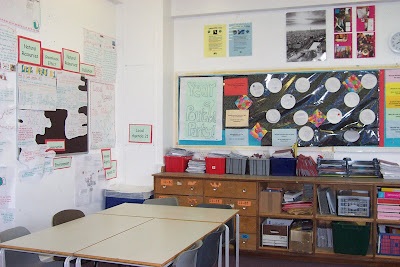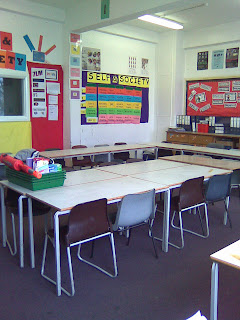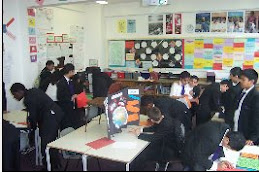I tried a few techniques for 'collecting in' exercfise books including utilising drawers at the back of the room for my Year 11 work and crates. The problem? Students pulled the tabs from the drawers and I didn't know which crate belonged to which class. I also didn't fancy having 21 crates for each different class. My classroom soon became a mess. See below:
 I had the added problem that I would forget to collect in resources used in the lesson. For instance, there would be 30 seconds of lesson time left but glue sticks, worksheets, laminates AND books were still everywhere. How could I quickly collect things in and move to the next set of pupils without losing track of myself?
I had the added problem that I would forget to collect in resources used in the lesson. For instance, there would be 30 seconds of lesson time left but glue sticks, worksheets, laminates AND books were still everywhere. How could I quickly collect things in and move to the next set of pupils without losing track of myself?Two solutions became apparent.
1. Get a set of drawers near the door to be used for that day's classes. Period 1 resources were kept in drawer 1. Period 2, drawer 2. And so on. At the end of the lesson I then frantically pulled all the resources back in, threw them into the drawer, and then opened the next drawer down to find my new set of freshly prepared materials.
1. Get a set of drawers near the door to be used for that day's classes. Period 1 resources were kept in drawer 1. Period 2, drawer 2. And so on. At the end of the lesson I then frantically pulled all the resources back in, threw them into the drawer, and then opened the next drawer down to find my new set of freshly prepared materials.
At the end of each day I would sort the materials back into the proper (now neater) system where they are held until next week.
2. Use paper for work and keep it in box files instead of having exercise books. This way I could keep everything together in a box file, it was quicker to collect in papers for the drawer system than it was to collect in books and it used way less paper than books. Most exercise books have blank pages at the end of the year and this avoids the problem.
Gradually my classroom came to look like this and my students (and I) found it a much more sane and calm place to work:






